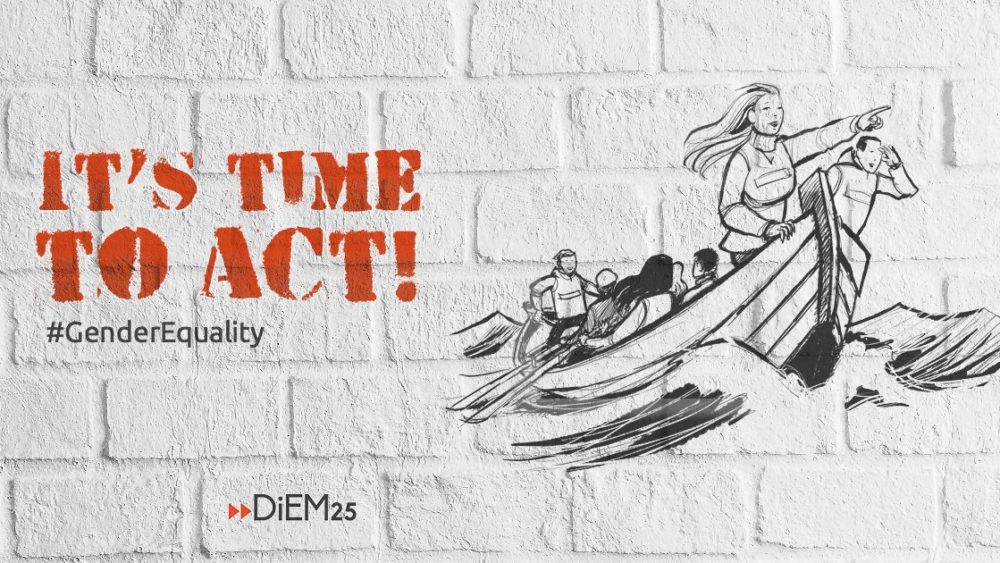We talk a lot about austerity in DiEM25. We publish articles condemning austerity, we keep it at the heart of our manifesto, and we challenge it in our European New Deal. We march against it, hold seminars critiquing it and vote for politicians who oppose it.
And yet, we appear to be missing a fundamental piece of the puzzle: Austerity is also a feminist issue. Following the 2008 financial crisis, many European governments imposed austerity measures, either obligated to do so by the ‘troika’, or by choice, often for reasons of ideology. The catastrophic impacts of these measures are well-documented, but what is sometimes absent from such analysis is how austerity impacts men and women in very different ways and to very different extents.
Triple jeopardy
Women are affected by the so-called ‘triple jeopardy’ of austerity. First, women tend to be more dependent on the welfare state than men, owing to pre-existing economic disadvantage. Benefits, including tax credits, make up a larger proportion of women’s income, owing, in part, to their role (usually) as a family’s primary caregiver.
Second, across Europe, women constitute between 60% and 70% of the public sector workforce, making them more adversely affected by public sector pay freezes and lay-offs.
And third, where public services are cut, women typically pick up the slack, especially with regard to care and domestic work. Between 2010 and 2015, social care in the UK was cut by 23% and childcare by almost 20%. In cases where women do compensate for these cuts, their access to paid work is reduced, making them more vulnerable to financial insecurity and poverty.
In fact, in the UK, it has been estimated that 80% of the burden of budget cuts falls on women, and especially on those women who can least afford it. By 2020-21, women in the UK will have seen, on average, a 2.5% reduction in net income (compared with 1.3% for men), and an Asian woman in the poorest third of the population will lose the equivalent of 11.5% of her net income (a staggering 2,320€).
There are other painful connections between gender and austerity. In 2013, the International Labour Conference observed the ‘nullifying [of] the binding nature of collective agreements’ in Greece. Those who are most harmed by such a nullification are those in precarious employment (temporary or part-time work), who are, again, invariably women. Meanwhile, income tax cuts and reductions in corporation tax favour higher earners – usually men – while increases in VAT hit women and poorer people harder as a greater proportion of their income is spent on consumption.
Austerity as a reflection of gender bias
Austerity is a moral issue because it erodes efforts to challenge gender inequality, to which all EU states are legally committed. But beyond the morals, austerity is just bad policymaking.
The LSE Professor, Diane Perrons notes that ‘the implicit assumption that economic policies are purely aimed at creating wealth, while social policies, including gender policies, are only redistributive, needs to be challenged.’
When countries do spend in times of crisis, they usually invest in physical infrastructure projects (including workers’ wages) as this spending is permitted to exceed the Stability and Growth Pact (SGP) public debt and deficit conditions. Public sector spending, however, is considered part of ‘current expenditure’ and is therefore subject to the SGP conditions. This not only overlooks the fact that investing in social infrastructure produces long-term benefits such as a better-educated and healthier workforce, it demonstrates the inherent gender bias in economic theory.
In actual fact, investment in social care generates higher economic and social gains than investment in physical infrastructure. It has been estimated that investing 2% of GDP in the care industry would generate twice as many jobs compared with an equivalent investment in construction. This would result in nearly a million new jobs in Italy, just over two million in Germany and 1.5 million in the UK. Add to this the fact that professional care is a low-carbon emission industry, supporting the transition to a low-carbon economy, and it becomes clear that current economic practice is limited by prejudices about the ‘value’ of different types of work.
So when we want to talk about austerity (and we do!), we cannot view it as an abuse with blanket impacts. Challenging it requires acknowledgement of the gendered nature of austerity, as well as the development of policies that recognise the importance of social investment for society as a whole.
Kate is a member of DiEM25’s DSC Gender Equity 1. The thematic DSC on Gender Equity has recently been established to address issues relating to the care economy, women’s rights in Europe and gender balance within DiEM25 at all levels. If you would like to be involved in the thematic DSC, or for more information, please send us an e-mail.
Artwork: Wilfred Hildonen (DiEM25 Communications)
Do you want to be informed of DiEM25's actions? Sign up here















